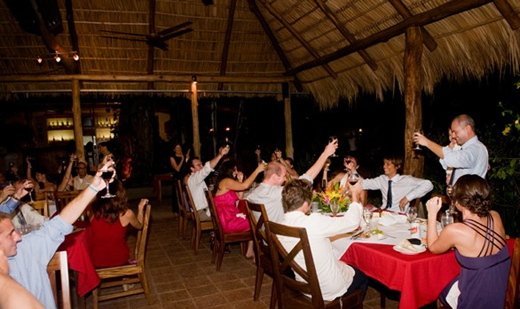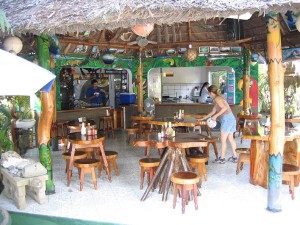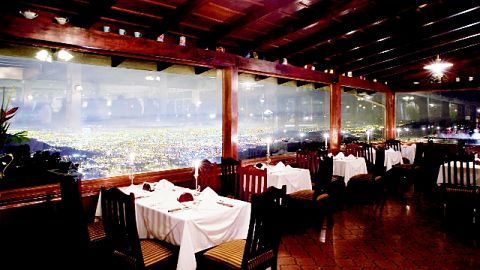Costa Rica Living – I traveled back to the States not long ago to visit my mother. At quite a nice restaurant, I was struck by the cultural differences between dining in the US and Costa Rica.
 Our waiter was efficient and polite. He refilled water glasses when only half empty, asked if everything was all right, and fluttered over us with hummingbird intensity. Once we finished our main course, he whisked our plates off the table—I was still chewing that last morsel. And, while still holding our dirty dishes aloft, he inquired if we wanted dessert. We shook our heads. Coffee, perhaps? No, thank you. Is there anything else I can do for you? The bill, please. We were in and out in an hour. It was all done with courtesy and polish, but I felt rushed and rather irritated by the time I paid the bill and left the waiter a tip.
Our waiter was efficient and polite. He refilled water glasses when only half empty, asked if everything was all right, and fluttered over us with hummingbird intensity. Once we finished our main course, he whisked our plates off the table—I was still chewing that last morsel. And, while still holding our dirty dishes aloft, he inquired if we wanted dessert. We shook our heads. Coffee, perhaps? No, thank you. Is there anything else I can do for you? The bill, please. We were in and out in an hour. It was all done with courtesy and polish, but I felt rushed and rather irritated by the time I paid the bill and left the waiter a tip.
I missed my leisurely routine of eating out in Costa Rica.
This is how it works when my husband and I dine at a favorite Italian restaurant in the San José area. We arrive and the waitstaff offers us our choice of tables. If we choose a table for four, there is no complaint. They simply remove the silverware of the extra place settings. We are handed menus and we order a glass of wine and ask for bread. After the waiter brings these, he does not disturb us until we either raise a hand or he sees our menus are closed and set to one side. If we are waiting for other guests to arrive—as is often the case—no one bothers us unless we want something.
When our meal does arrive, the waiter serves us, asks if we need anything, and retires. To get service, my husband simply raises a finger or catches the waiter’s eye and lifts his chin indicating a desire for assistance. Plates are often left on the table for ten minutes—or at least until the last person at the table has finished eating. The only time they are picked up more rapidly is if the dining area is outside and the risk of attracting flies outweighs decorum.
When the waiter does clear our plates, he never asks if we want anything more. He simply takes the plates away. If we want dessert or coffee, we gesture. We can visit with each other or sit in silence until we are ready to leave… or the place closes. There is no pressure, only an implied agreement that we have rented the space until we are ready to go. I’m often surprised to discover we have been there for two hours, sometimes more.
La cuenta, the check, includes the price of our meal, a 13 percent state tax, and a 10 percent tip for the waiter. If we wish to add to that we can, but it is not necessary. In fact, most Costa Ricans do not because waitstaff is paid a living wage, including healthcare and retirement.
Many people from the States, when they first encounter this relaxed atmosphere, feel frustrated that they aren’t getting service with a capital S. And, for sure, the waiters do not hover, but it is so much more relaxing to eat without the continual nudge to finish.
We tried a newish restaurant on our last trip to the capital. It is in an area of San José where a lot of tourists gather, and I noted the waiters were over-attentive, probably trying to appeal to that clientele, or perhaps to garner more tips from unknowing diners.
And here’s the deal (as I see it): American waiters and restauranteurs churn tables for tips and sales. Waiters are not paid a living wage and must survive on the kindness of strangers, so it makes sense for them to speed up your dinner, get you out the door, and replace you with another possible tip prospect. The owners keep waiters underpaid to flip tables and increase sales. But in Costa Rica, from the casual plata del dia to the white table-clothed gastronomic adventure, most waiters are courteous, pleasant and are willing to help, but only if you ask.
This may be a cultural difference beyond the capitalist leanings of American restauranteurs, though. American English has only one word for the act of taking in food. We eat breakfast, lunch, and dinner. Costa Rican Spanish, on the other hand, has specific verbs attributed to each meal. We desayunar (eat breakfast), almorzar (eat lunch), and cenar (eat dinner). Meals and eating itself is held in high esteem; time with family or friends is honored. It is considered rude to approach a table and carry on a conversation with Costa Ricans while they are dining. If they visit your table, they will chat until the food arrives, and then excuse themselves offering the polite salutation, buen provecho, good appetite, or enjoy your meal.
In the last few years the American fast food storm has descended on Costa Rica with a vengeance. There are now KFCs, Subways, Micky Ds, and Burger Kings springing up in neighborhoods like dandelions.
Please, Costa Rica, in your haste to emulate the first world, and specifically the US food trends, do not lose track of your laid back and gracious service. I, for one, would miss it dearly.
Sarah Corbett Morgan
Blog: www.scmorgan.com
Facebook Page: www.facebook.com/writer.scmorgan

